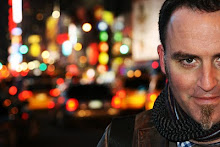I rushed into town at lunch to see Rose Bruford School's graduation showcase, my fourth showcase in as many weeks. I was largely there to see their cohort of actor musicians, one of whom, the fabulously-named Tilly Mae Millbrook, sang I Make The Shells from Brass. She did an absolutely wonderful job. I was pleased to see that the young people did all of their own arrangements of the songs, and I felt my piece had been particularly sensitively handled by a young lad called Euan Wilson.
There's some sort of exhibition going on at Tate Britain at the moment which purports to be a celebration of "queer art," a term I absolutely hate. I get why the organisers have opted to use the word: It's really cool and edgy and quite shocking. It's the equivalent of Channel 4 peppering their show titles with swear words and provocative language. Some curator or artist will have argued that "queer art" is a movement and an acceptable term these days. They'll say they're simply reclaiming a word which was used against my generation as a horrible slur. I hate the word. In my opinion, it's right up there with "faggot" and "yid" andcertainly doesn't need to be "reclaimed" for a retrospective of the works of great artists like Hockney and Bacon. To make matters worse, the collection of paintings is there to celebrate the de-criminalisation of homosexuality fifty years ago, and I'm fairly sure that the artists featured wouldn't particularly want a controversial and highly negative word like queer to be used either to describe their work or as part of a celebration of something very positive. Perhaps I'm wrong.
The word queer struck fear into the heart of children growing up gay in the 80s. The word, for me, triggers self-loathing, and is wrapped up in a hopeless fear of HIV and the sense of helplessness we all felt when confronted by homophobia. It reminds me that I always thought being queer-bashed was an inevitability. Something I would have to experience if I "chose" to be gay.
I have noticed that gay women are more forthcoming when it comes to "reclaiming" the term queer, and I suspect this is because the word was historically not as often used so viciously against them. I felt very uncomfortable when I heard a woman talking about queer art on Radio 4 in relation to this exhibition. I'm not sure you can decide to reclaim a word unless you have had that word spat in your face.
Nathan has a slightly different view to me and believes the meaning of the word has shifted since the 80s. The word, to him, no longer refers exclusively to gay men, and has a much more global context for anybody who does not identify as heterosexual. There are, he says, many people who proudly, nay fiercely, assert their right to identify as queer, and feel that the term best describes who they are. It should, perhaps, also be remembered that the word was used extensively by gay people in the 1970s.
That aside, I'm not sure any self-respecting artist would actually want, or even allow, their sexuality to define their art. I am a composer who happens to be gay. Sometimes the characters I create are gay. Sometimes I'll even consider writing a piece which wears it gayness like a badge of honour, but I am not a queer artist. Or even a gay artist. I'm simply an artist.
When I wrote the London Requiem back in 2012, the work became the subject of ten films which explored the composition's various themes. I talked openly about my sexuality in the films, and admitted that it's definitely a factor which spurs me on to write. Without children, my one hope of a legacy on this planet is my work. I was mentored through the experience by a senior director of classical music at the BBC, who said, in his summing up meeting with me, that the films I'd made were "too gay." When asked to qualify, he said that the "gayness" might put my target audience off. I was too shocked at the time to question this somewhat bizarre statement. I wonder if Bacon's paintings will be described as "too gay" as a result of being featured in this exhibition?
I'm not offended. In order to be offended offence has to be meant. The organisers of this exhibition plainly didn't mean to cause offence. They were simply, in my view, careless. Some people might want to reclaim this word. Others, like me, still find it incredibly distasteful and don't like to see it plastered all over the tube. Perhaps, a little more research could have been done before hitting the button marked "trendy."

No comments:
Post a Comment
Note: only a member of this blog may post a comment.